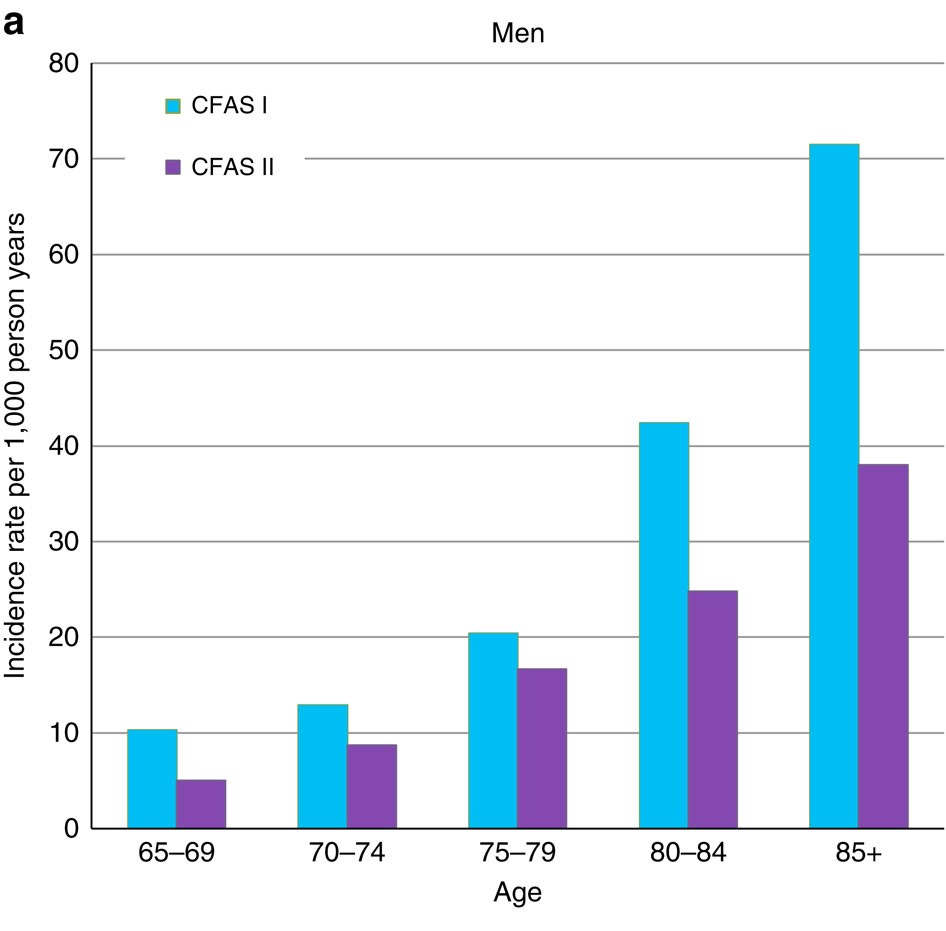UK study: Dementia rates significantly lower than forecasted–especially for men–highlighting the protective role of lifestyle and education

– Incidence rate of dementia per 1,000 person years in CFAS I (conducted in the 90s) and CFAS II (just finished) by age at baseline interview. Natural scale. Source: Study referenced below.
Drop in dementia rates suggests disease can be prevented, researchers say (The Guardian):
“In the UK, dementia has fallen by a fifth over the past 20 years, possibly down to lifestyle and education changes, highlighting benefits of preventative action…
A team from three British universities concluded that as a result the number of new cases of dementia is lower than had been predicted in the 1990s, estimated at around 210,000 a year in the UK as opposed to 250,000…The findings are potentially significant because they suggest that it is possible to take preventative action, such as stopping smoking and reducing cholesterol, that could help avoid the condition.
Nick Fox, professor of neurology at University College, London, who was not involved in the study, agrees: “This does suggest that our risk, in any particular age in later life, can be reduced probably by what we do 10, 20 or 30 years before.”
The trend emerges from a dramatic drop in new cases for men across all age groups. In the 1990s study, for every 1,000 men aged 70–74, 12.9 went on to develop dementia within a year. In the second study, 20 years later, that figure had dropped to only 8.7 men. For men aged 65–69 the rate of new cases had more than halved between the two studies…The situation for women was more complex: while those aged 80–84 showed a small increase in rates between the two studies, there was a slight drop for other age groups.”
To learn more:
Study: A two decade dementia incidence comparison from the Cognitive Function and Ageing Studies I and II (Nature Communications)
- Abstract: Dramatic global increases in future numbers of people with dementia have been predicted. No multicentre population-based study powered to detect changes over time has reported dementia incidence. MRC Cognitive Function and Ageing Study (CFAS) undertook baseline interviews in populations aged 65+ years in England and Wales (1989–1994). Three areas (CFAS I) were selected for new sampling two decades later (2008–2011) with same geographical boundaries, sampling and approach methods (CFAS II). At 2 years CFAS I interviewed 5,156 (76% response) with 5,288 interviewed in CFAS II (74% response). Here we report a 20% drop in incidence (95% CI: 0–40%), driven by a reduction in men across all ages above 65. In the UK we estimate 209,600 new dementia cases per year. This study was uniquely designed to test for differences across geography and time. A reduction of age-specific incidence means that the numbers of people estimated to develop dementia in any year has remained relatively stable.


